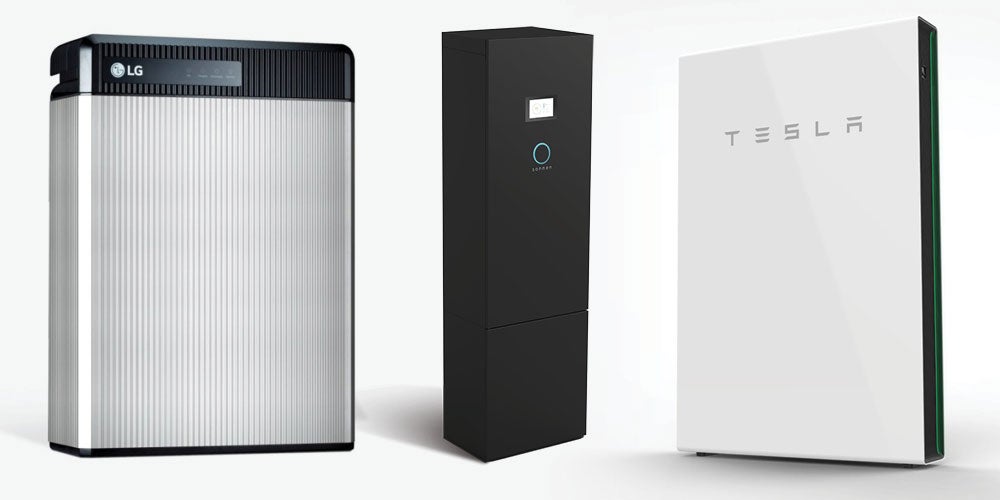Lithium-Ion Solar Batteries—Are They Good As An Energy Storage Option?
In recent years, lithium-ion has become the standard for solar batteries globally. People started to wonder if this is also an option for good, reliable, and stable energy storage for homes and businesses with its increasing popularity. In this article, we’ll try to answer this question by giving you an overview of lithium-ion, its advantages and disadvantages, and how it stacks up against other storage batteries.
Table of Contents
What Are Lithium-Ion Solar Batteries?
Lithium-ion batteries are renewable energy battery storage made with lithium metal or lithium compounds as an anode. These are sometimes called “secondary cells” because they use a reversible electrochemical reaction to store energy instead of using chemical compounds as primary “disposable” batteries do.
Types Of Lithium-Ion Solar Batteries
The two main categories of lithium-ion batteries are lithium iron phosphate (lithium iron) and lithium-nickel-manganese-cobalt oxide (NMC). Both types are generally used for solar energy storage in residential homes.
Lithium-ion batteries have a longer lifespan than NMC batteries, but they also have a lower energy density. This means that the same battery volume will yield less power, or a battery with a higher power output will be more significant. On the other hand, lithium-ion batteries are better suited to smaller solar systems where less energy needs to be stored.
NMC batteries have a shorter life than lithium-ion batteries. Still, more power can be stored in the same amount of space, beneficial for larger solar systems with high daily energy usage.
How Do Lithium-Ion Solar Batteries Work?
The lithium-ion solar batteries are made with two electrodes—an anode and a cathode—and a liquid or polymer electrolyte in between them. The cathode has lithium in it, while the anode is made up of carbon.
Lithium-ion particles move from the negative to the positive electrode through the electrolyte when charging your battery with photovoltaic panels. Electrons flow out of the negative electrode and into the external circuit producing electricity for your home.
Are Lithium-Ion Solar Batteries The Best Energy Storage Option?
Lithium-ion solar batteries are the most efficient and effective battery storage solutions in the current market.
They are effective because of several factors, including:
- Lithium-ion batteries have a much higher energy density than other batteries, which means they can store more energy and do not need to be replaced as often.
- Lithium-ion solar batteries also have a long cycle life compared to other batteries. This means they can be recharged thousands of times before needing replacement, which is better for the environment than replacing a battery after only a few years.
- The self-discharge rate is also very low for lithium-ion batteries, meaning that even if you don’t use your device for months at a time, it will still keep its charge and will be ready when you need it.
How Do Lithium-Ion Solar Batteries Compare To Other Storage Options?
.jpg)
Here’s a look at how Li-ion batteries compare to other storage options:
Lead-acid vs. lithium-Ion
Lead-acid (LA) batteries have been around long before the lithium-Ion battery. They’re cheap and easy to make, but they also last only about five years if you’re lucky. Deep cycle lead-acid batteries can last longer, but they still wear out faster than Li-ion solar batteries.
Li-ion batteries have been used in consumer electronics for decades, making them reliable and long-lasting (15 years). They also have a much higher energy density than LA batteries, meaning they can store more energy in a smaller space.
The Benefits Of Using Lithium-Ion Batteries
Lithium-ion has several advantages that make it ideal for off-grid and hybrid solar power systems.
- Lithium-ion batteries have a high energy density. So they can store more energy in a smaller space than other types of batteries.
- They have a long lifespan — with most lithium-ion battery packs lasting up to 10 years, with no significant loss of capacity over time.
- They can be discharged and recharged more times than other types of batteries.
- They have low maintenance requirements — they don’t need water topping up or regular attention. They will only require occasional cleaning.
- They are lightweight — making them easy to install and transport.
Lithium-ion solar batteries can be a viable energy storage option for your home if you need to reduce dependence on the power grid. Still, it is crucial to know how they work, how they charge, and how they will perform in your specific situation.

